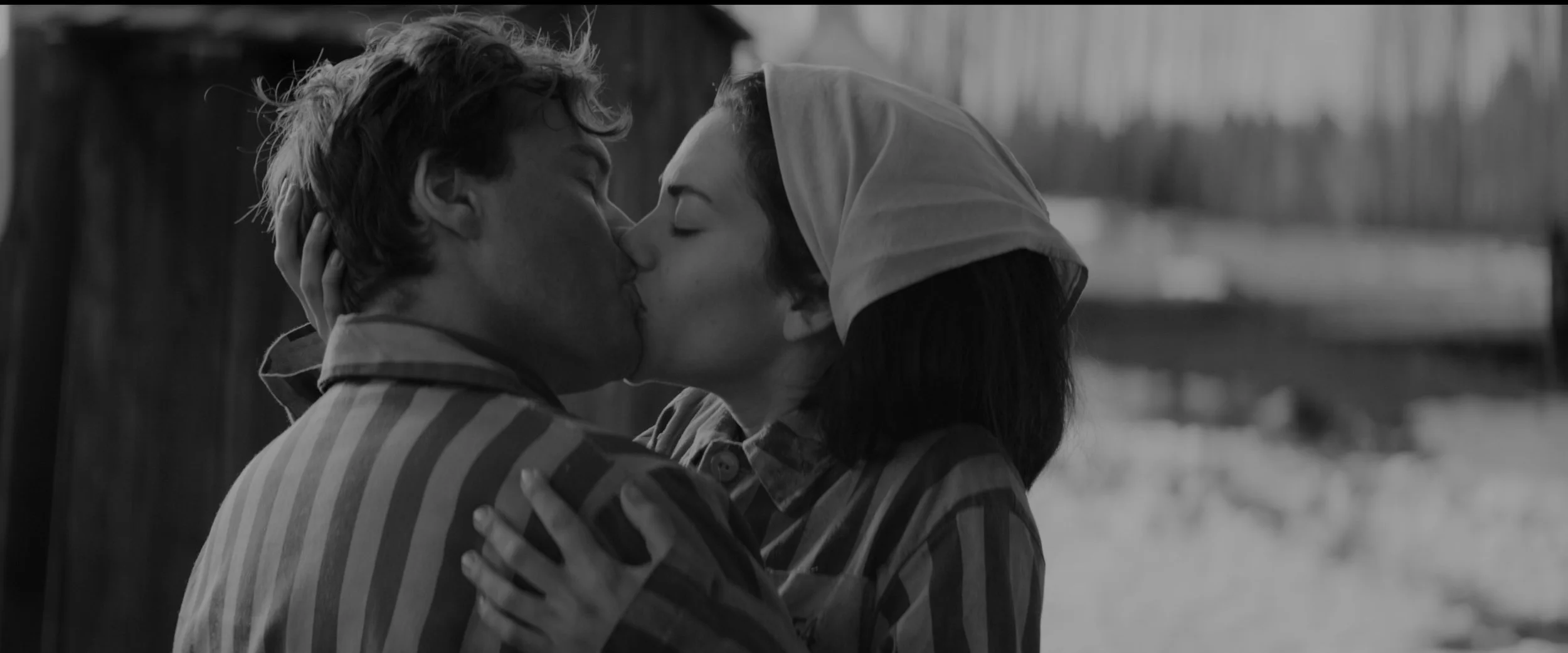Bau: Artist at War - The True-ish Story of Schindler’s List’s Wedding Couple
By Liam Lacey
Rating: C-
Critics have often faulted Holocaust movies for reducing the mass murder of six-million European Jews to melodramas about individual redemption, though such films are also praised for, however imperfectly, keeping historical memory alive.
Every so often, though, a film like Bau: Artist at War comes along which is so off-balance it feels, not just flawed, but embarrassing, an unintentional parody of the ethically entangled genre.
Emile Hirsch and Inbar Lavi in Bau: Artist at War
Directed by Sean McNamara (responsible for last year’s hagiographical biopic Reagan), and scripted by a trio of writers, the film stars American actor Emile Hirsch as the Polish-born Israeli artist, concentration camp survivor and memoirist, Joseph Bau. Bau spent most of his early twenties in the Kraków ghetto and the nearby Kraków-Placzów concentration camp, where he met and secretly married his wife, Rebecca Tennenbaum, an event depicted in Steven Spielberg’s 1993 film, Schindler’s List.
In the coda of that film, the real Joseph Bau appears along with Rebecca among the queue of people dropping a commemorative stone on Schindler’s grave.
McNamara’s film, echoing Spielberg’s, employs desaturated or black-and-white palette for the war-period, and colour in the post-War scenes. We begin in Tel Aviv in 1971 when a young lawyer (Josh Zuckerman) arrives at Bau’s studio requesting his help in help in testifying against a murderous former Nazi camp guard, Franz Grüe (Yan Tual).
Hirsch, as Bau, first appears in what appears to be a shaggy white Beatle wig, with a salt-and-pepper moustache and glasses, unexpectedly speaking in an American accent.
Initially, Bau refuses the invitation to go to Vienna to testify against the guard but agrees to offering a tape-recorded deposition. Cut to a desaturated flashback to 1943 in the Kraków ghetto, where Bau, in his early twenties, is a regular scallywag, roaming the occupied streets of Kraków, forging papers to allow others to survive and planting an impudent kiss on the cheek of a flabbergasted Nazi before scampering away.
“I’m just trying to give people hope,” he tells his pessimistic father, “by reminding people that there are some things they can’t take away from us — laughter, joy, our spirits.”
Shortly after, the Germans close the ghetto, transferring Bau and his family to the Krakau-Plaszów forced labour and concentration camp. The screen turns to full black and white as life grows even grimmer.
Though, even as people are getting shot or beaten to death around him, Bau persists in raising the spirits of his fellow inmates. For example, he draws cartoons of flying birds pooping on saluting Nazis and cracks jokes about Hitler as “the little guy with the funny moustache and the tiniest peepee in the known universe.”
As a trained draughtsman, Bau is ordered to serve as a cartographer and sign maker to the sadistic commander of the camp, Amon Goeth (Josh Blacker). He also has time to flirt with and fall in love with the commandant’s manicurist, the comely, Rebecca (Israeli actress, Inbar Lavi).
And as they gaze in each other’s eyes, the sun emerges and coloured flowers suddenly appear in the black-and-white world. At the same time, Bau earns the enmity of the not overly bright guard, Franz Grũe (Yan Tual), who resents the commander’s special relationship with the “funny little Jew,” and gets revenge by killing Bau’s father.
Scenes shift back and forth in time, between the lead-up to 1971 trial in Vienna, and back to Bau’s journey through the war, where he ended up working at Oskar Schindler’s armaments factory. Though softer and less decisive than Liam Neeson’s version of the character, the wine-loving Oscar Schindler (Edward Foy) is a mensch, offering Bau comforting supporting words for his search for Rebecca: “Miracles can happen!”
The film’s dramatic climax is also its nadir in terms of authenticity, as Bau testifies at Grūen’s trial, cunningly tricking the defendant into angrily confessing his crime. Historical spoiler alert: That’s not what happened (check the memoir). This is a shame, as if Bau’s life experience and courage needed embellishment to cut it as a compelling story.
CLICK HERE to read Bonnie Laufer’s interview with director Stephen McNamara and star Emile Hirsch.
Bau: Artist at War. Directed by Stephen McNamara. Written by Deborah Smerecnik, Ronald Bass and Sonia Kifferstein. Starring: Emile Hirsch, Inbar Lavi, Josh Blacker and Yan Tuel. Bau: Artist at Warcan be seen in Toronto at the Varsity Cinema, in Vancouver at the International Village or 5th Avenue, in Montreal at the Forum Cineplex, in Ottawa at the Mayfair, in Calgary at the Country Hills, in Edmonton at the City Centre, in Whitby at the Whitby 24 and in Kanata at the Kanata 24.



